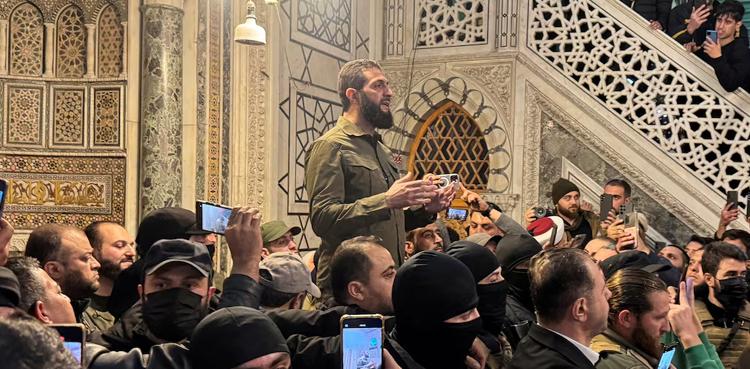
SYRIA: Damascus stirred back to life on Monday at the start of a hopeful but uncertain era after rebels seized the Syrian capital and President Bashar al-Assad fled to Russia, following 13 years of civil war and more than 50 years of his family’s brutal rule.
Busy traffic returned to the streets and people ventured out after a nighttime curfew, but most shops remained shut. Rebels milled about in the centre.
The main rebel commander Ahmed al-Sharaa, better known as Abu Mohammed al-Golani, met overnight with Assad’s Prime Minister Mohammed Jalali and Vice President Faisal Mekdad to discuss arrangements for a transitional government, a source familiar with the discussions told Reuters.
Al Jazeera television reported that the transitional authority would be headed by Mohamed Al-Bashir, who ran the administration in a small pocket of rebel-held territory before the 12-day lightning offensive that swept into Damascus.
Read More: Who is Abu Mohammed al-Golani: former al Qaeda chief who led overthrow of Syria’s Assad?
A source close to the rebels in Idlib confirmed Bashir had been nominated, though there had been no official announcement.
Syria’s banks would reopen on Tuesday and staff had been asked to return to offices, according to a Syrian central bank source and two commercial bankers. Syria’s currency would continue to be used, they said.
At the Interior Ministry that ran Assad’s police force, furniture had been looted and staff stayed away. Armed rebels were there to maintain order.
The oil ministry called on all employees in the sector to head to their workplaces starting on Tuesday, adding that protection would be provided to ensure their safety.
Fighters from the remote countryside milled about in the capital, clustering in the central Umayyad Square.
“We had a purpose and a goal and now we are done with it. We want the state and security forces to be in charge,” said Firdous Omar, who said he had been battling the Assad government since 2011 and was now looking forward to laying down his weapon and returning to his job as a farmer in provincial Idlib.
The advance of a militia alliance spearheaded by Hayat Tahrir al-Sham (HTS), a former al Qaeda affiliate, was a generational turning point for the Middle East.
It ends a war that killed hundreds of thousands, caused one of the biggest refugee crises of modern times and left cities bombed to rubble, countryside depopulated and the economy hollowed out by global sanctions. Millions of refugees could finally go home from camps across Turkey, Lebanon and Jordan.
Assad’s fall wipes out one of the main bastions from which Iran and Russia wielded regional power. Turkey, long aligned with Assad’s foes, emerges strengthened.
The Arab world faces the task of reintegrating one of the Middle East’s pivotal states, while containing the militant Sunni Islam that has in the past metastasized into the sectarian violence of Islamic State.
HTS is still designated as a terrorist group by the United Nations, but has spent years trying to soften its image to reassure foreign states and minority groups within Syria.
‘A NEW HISTORY’
The group’s leader Golani, who spent years in U.S. custody as an insurgent in Iraq but later broke with al Qaeda and Islamic State, has vowed to rebuild Syria.
“A new history, my brothers, is being written in the entire region after this great victory,” he told a huge crowd at the 1,300-year-old Umayyad Mosque in Damascus on Sunday.
The rebels announced on their Telegram channel that they were granting amnesty to all conscript soldiers drafted under Assad.
Assad’s Prime Minister Jalali told Sky New Arabia he was ready to provide documents and help for the transfer of power.
The fate of Syria’s army would be “left to the brothers who will take over the management of the country’s affairs”, Jalali said. “What concerns us today is the continuation of services for Syrians.”
Assad’s police state was known for generations as one of the harshest in the Middle East, holding hundreds of thousands of political prisoners. On Sunday, elated inmates poured out of jails.
One of the final areas to fall was the Mediterranean coast, heartland of Assad’s Alawite sect and site of Russia’s naval base.
Two Alawite residents said so far the situation had been better than expected, seemingly without retribution against Alawites. One said a friend was visited at home by rebels who told him to hand over any weapons he had, which he did.
Near Latakia, a rebel delegation entered the Assad family’s hometown of Qardaha and met with elders there, one resident said, describing the interaction as calm. The town is the site of a mausoleum for Assad’s father who seized power in a coup in 1970 and ruled until his death in 2000.
The Kremlin said it was too early to know the future of Russia’s military bases in Syria, but it would discuss the issue with the new authorities.
Israel said Assad’s fall was a direct consequence of Israel’s punishing assault on Iran’s Lebanese allies Hezbollah, who had propped up Assad for years.
Since rebels entered Damascus, Israel has struck sites in Syria. Israeli officials said those air strikes would carry on for days, to keep Assad’s former arsenal out of hostile hands.
The U.S., which has 900 soldiers in Syria alongside Kurdish-led forces in the east, said its forces hit around 75 targets in air strikes on Islamic State on Sunday.
The U.S.-backed Kurdish forces have clashed with Turkey-backed rebels in the north. A video, verified by Reuters, showed rebels entering the town of Manbij, captured from the Kurdish forces on Monday.
from ARY NEWS https://ift.tt/c5ezf9Q

No comments:
Post a Comment